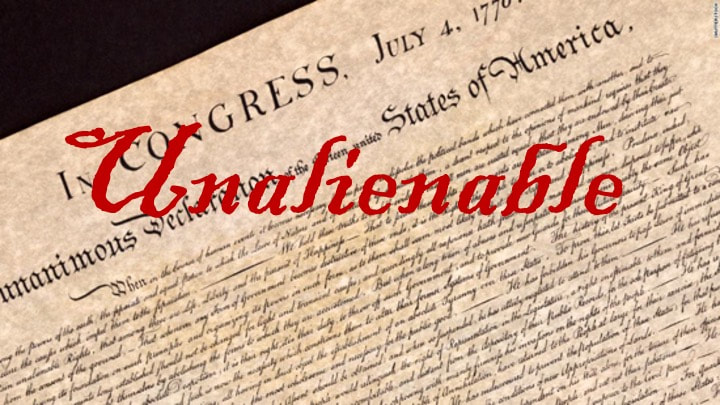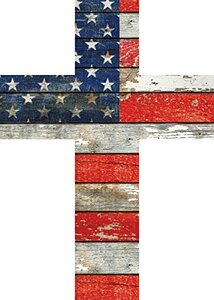Unalienable Rights
|
We hold these truths to be self-evident, that all men are created equal, that they are endowed by their Creator with certain unalienable rights, that among these are life, liberty, and the pursuit of happiness. That, to secure these rights, governments are instituted among men, deriving their just powers from the consent of the governed. That, whenever any form of government becomes destructive of these ends, it is the right of the people to alter or to abolish it, and to institute new government, laying its foundation on such principles, and organizing its powers in such form, as to them shall seem most likely to effect their safety and happiness.
WELCOME TO OUR FREEDOM FIGHTER WEBSITE! |
This website is for all patriots and freedom lovers who are willing to learn, love, and fight for our
UNALIENABLE God-given rights!
Please go to the CONTACT page, SUBSCRIBE to our newsletter, YouTube and other content channels.
TOGETHER we will reclaim and maintain FREEDOM for WE THE PEOPLE ... Everywhere.
Unalienable Rights - Absolute Rights - Natural Rights
The absolute rights of individuals may be resolved into the right of personal security, the right of personal liberty, and the right to acquire and enjoy property. These rights are declared to be natural, inherent, and unalienable.
Atchison & N. R. Co. v. Baty, 6 Neb. 37, 40, 29 Am. Rep. 356.
By the "absolute rights" of individuals is meant those which are so in their primary and strictest sense, such as would belong to their persons merely in a state of nature, and which every man is entitled to enjoy, whether out of society or in it. The rights of personal security, of personal liberty, and private property do not depend upon the Constitution for their existence. They existed before the Constitution was made, or the government was organized. These are what are termed the "absolute rights" of individuals, which belong to them independently of all government, and which all governments which derive their power from the consent of the governed were instituted to protect.
People v. Berberrich (N. Y.) 20 Barb. 224, 229; McCartee v. Orphan Asylum Soc. (N. Y.) 9 Cow. 437, 511, 513, 18 Am. Dec. 516; People v. Toynbee (N. Y.) 2 Parker, Cr. R. 329, 369, 370 (quoting 1 Bl. Comm. 123).
Chancellor Kent (2 Kent, Comm. 1) defines the "absolute rights" of individuals as the right of personal security, the right of personal liberty, and the right to acquire and enjoy property. These rights have been justly considered and frequently declared by the people of this country to be natural, inherent, and unalienable, and it may be stated as a legal axiom [A principle that is not disputed; a maxim] that since the great laboring masses of our country have little or no property but their labor, and the free right to employ it to their own best interests and advantage, it must be considered that the constitutional inhibition against all invasion of property without due process of law was as fully intended to embrace and protect that property as any of the accumulations it may have gained. In re Jacobs (N. Y.) 33 Hun, 374, 378.
EXERCISE YOUR UNALIENABLE RIGHTS WITH RESPECT FOR OTHERS
AND NEVER LET GOVERNMENT DEPRIVE YOU OF THEM!
The absolute rights of individuals may be resolved into the right of personal security, the right of personal liberty, and the right to acquire and enjoy property. These rights are declared to be natural, inherent, and unalienable.
Atchison & N. R. Co. v. Baty, 6 Neb. 37, 40, 29 Am. Rep. 356.
By the "absolute rights" of individuals is meant those which are so in their primary and strictest sense, such as would belong to their persons merely in a state of nature, and which every man is entitled to enjoy, whether out of society or in it. The rights of personal security, of personal liberty, and private property do not depend upon the Constitution for their existence. They existed before the Constitution was made, or the government was organized. These are what are termed the "absolute rights" of individuals, which belong to them independently of all government, and which all governments which derive their power from the consent of the governed were instituted to protect.
People v. Berberrich (N. Y.) 20 Barb. 224, 229; McCartee v. Orphan Asylum Soc. (N. Y.) 9 Cow. 437, 511, 513, 18 Am. Dec. 516; People v. Toynbee (N. Y.) 2 Parker, Cr. R. 329, 369, 370 (quoting 1 Bl. Comm. 123).
Chancellor Kent (2 Kent, Comm. 1) defines the "absolute rights" of individuals as the right of personal security, the right of personal liberty, and the right to acquire and enjoy property. These rights have been justly considered and frequently declared by the people of this country to be natural, inherent, and unalienable, and it may be stated as a legal axiom [A principle that is not disputed; a maxim] that since the great laboring masses of our country have little or no property but their labor, and the free right to employ it to their own best interests and advantage, it must be considered that the constitutional inhibition against all invasion of property without due process of law was as fully intended to embrace and protect that property as any of the accumulations it may have gained. In re Jacobs (N. Y.) 33 Hun, 374, 378.
EXERCISE YOUR UNALIENABLE RIGHTS WITH RESPECT FOR OTHERS
AND NEVER LET GOVERNMENT DEPRIVE YOU OF THEM!
GET THE FREEDOM INFO PACK BY DONATING BELOW!
Bitcoin Donations: 3ESxeAP2gndAXeMDHycqKU8dLkHEv2txo6
Stellar Lumens Donations: GDV7RAQOYCKJH7PQHK7FNJERMEZY7GXHQN2P33PZVKXFHISZDWNUTHBN



